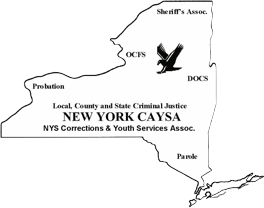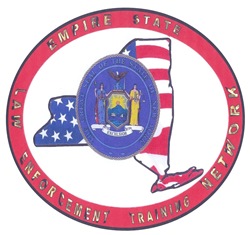April 11, 2014
Correction Officers in County Facilities Can Earn 14 College Credits at No Cost
(ALBANY, N.Y. – April 14, 2014) Correction officers serving in New York state county facilities will be awarded 14 college credits upon completion of the New York State Municipal Police Training Council Basic Course for Correction Officers and enrollment at SUNY Empire State College.
The opportunity, which comes at no cost to correction officers, is the result of a newly established partnership.
The New York Corrections and Youth Services Association, the state chapter of the American Correctional Association, in collaboration with the Empire State Law Enforcement Training Network and the New York State Sheriffs’ Association first engaged Empire State College to perform a professional learning evaluation of the basic course for correction officers for academic credit.
Subsequently, the four organizations entered into an agreement which provides correction officers with the opportunity to earn, or complete, their college degree at a reduced cost.
Qualifying officers enrolling with with the college also will receive pre-enrollment advisement at information sessions tailored to their needs, a waiver of the college orientation fee and a modest scholarship.They may study at one of the college’s 35 locations throughout the state, online, or through a combination of both.
More information about the program is available at http://choose.esc.edu/lp/partnerships/municipal-police-training-council/.
 “We are proud to partner with the New York Corrections and Youth Services Association, the Empire State Law Enforcement Training Network and the New York State Sheriffs’ Association to help their members achieve their personal, professional and educational goals,” said Merodie A. Hancock, president of the college. “We value and respect the learning that takes place as a result of the training of some of the state’s most dedicated public servants. Empire State College’s flexibility around when, where and how to study suits those who work shifts and manage changing schedules and have family, community and other life commitments. Expanding access and opportunity, reducing costs and accelerating degree completion is what Empire State College is all about.”
“We are proud to partner with the New York Corrections and Youth Services Association, the Empire State Law Enforcement Training Network and the New York State Sheriffs’ Association to help their members achieve their personal, professional and educational goals,” said Merodie A. Hancock, president of the college. “We value and respect the learning that takes place as a result of the training of some of the state’s most dedicated public servants. Empire State College’s flexibility around when, where and how to study suits those who work shifts and manage changing schedules and have family, community and other life commitments. Expanding access and opportunity, reducing costs and accelerating degree completion is what Empire State College is all about.”
“As a Dual Member Chapter of the American Correctional Association, NYCAYSA is committed and dedicated to individual advancement and professional development of all working members in the fields of corrections and criminal justice through participation in quality training and educational opportunities,” said Michael Graziano, state chapter president of NYCAYSA. “The credit-bearing partnership with SUNY Empire State College is a working example of how NYCAYSA will initiate partnerships and collaborate with other system stakeholders to create innovative mechanisms to accomplish goals that further the mission of the American Correctional Association and NYCAYSA.”
 “On behalf of the Empire State Law Enforcement Training Network, it was a gratifying experience working with NYCAYSA, NYSSA and SUNY Empire State College to develop this initiative, which validates the educational content of the current training requirements,” said Mark Rosenzweig, president of the Empire State Law Enforcement Training Network and a lieutenant with the Albany County Sheriff’s Office. “Now, under the guidance of a mentor, students have the potential to develop their existing skills, as well as acquire additional intellectual and cognitive attributes that they can apply on a daily basis to the workplace and, in so doing, make themselves an attractive candidate for promotion and other leadership opportunities.”
“On behalf of the Empire State Law Enforcement Training Network, it was a gratifying experience working with NYCAYSA, NYSSA and SUNY Empire State College to develop this initiative, which validates the educational content of the current training requirements,” said Mark Rosenzweig, president of the Empire State Law Enforcement Training Network and a lieutenant with the Albany County Sheriff’s Office. “Now, under the guidance of a mentor, students have the potential to develop their existing skills, as well as acquire additional intellectual and cognitive attributes that they can apply on a daily basis to the workplace and, in so doing, make themselves an attractive candidate for promotion and other leadership opportunities.”
 “The Sheriffs’ Association is very happy with the decision to grant college credit for correction officer training,” said Christopher J. Moss, president of NYSSA and Chemung County sheriff. “We know that our officers are professional and dedicated workers, often doing a very difficult job. The substantial training that they receive requires many hours of study, which enables correction officers to properly perform their duties 24/7, year-round. We appreciate the recognition for the quality of the correction officer training, as reflected by the awarding of college credits.”
“The Sheriffs’ Association is very happy with the decision to grant college credit for correction officer training,” said Christopher J. Moss, president of NYSSA and Chemung County sheriff. “We know that our officers are professional and dedicated workers, often doing a very difficult job. The substantial training that they receive requires many hours of study, which enables correction officers to properly perform their duties 24/7, year-round. We appreciate the recognition for the quality of the correction officer training, as reflected by the awarding of college credits.”
The Municipal Police Training Council, which is staffed by New York State Division of Criminal Justice Services , developed the basic course for correction officers and sets minimum training requirements for officers who work in facilities operated by municipalities.
“DCJS is pleased to support the efforts of these professional organizations and Empire State College to provide correction officers with credit for what they have learned through their training,” said Michael C. Green, DCJS executive deputy commissioner. “We will provide officers who successfully complete the course with the documentation they need to obtain credits from Empire State College toward the degree of their choice.”
The course is taught by MPTC-certified instructors from local correctional facilities throughout New York State.
The MPTC also sets minimum training requirements for newly appointed police officers, a course of training for police officers appointed to supervisory positions, recommends rules and regulations for minimum standards for law enforcement, correctional training programs and instructor certifications and develops and approves model policies.
About the MPTC Basic Course for Correction Officers
The state requires all county-employed correction officers to complete the four-week, 156-hour basic course for correction officers. Course topics include, but are not limited to, ethics in law enforcement; legal issues, constitutional law, civil law and courtroom structure; criminal procedure law; penal law; effective communications, conflict resolution, interview and interrogation; and suicide prevention.
In addition, correction officers take classes and receive training in first aid and defensive tactics. If officers carry firearms in the course of their duties, they receive firearms training as part of their basic training. They also must complete a correction practicum, which is the in-service, field-training component, as part of the program, as required by their employer.
A complete listing of the basic course for correction officers’ curriculum is available in Appendix A of the “Basic Course for Correction Officers Administrator’s Guide” at http://www.criminaljustice.ny.gov/ops/docs/training/pubs/basicpeace/basiccoursecorrectionsofficersadminguide.pdf
About SUNY Empire State College
SUNY Empire State College is a national and world leader in evaluating and awarding college credit for college-level learning gained through corporate, military, medical and many other forms training, as well as learning gained through work and life experience.
The nontraditional, open college of the SUNY system, Empire State College educates more than 20,000 students worldwide at eight international sites, more than 35 locations in the state of New York, online, as well as face to face and through a blend of both, at the associate, bachelor’s and master’s levels.
The average age of an undergraduate student at the college is 35 and graduate students average age 40.
Most Empire State College students are working adults. Many are raising families and meeting civic commitments in the communities where they live, while studying part time.
In addition to awarding credit for prior college-level learning, the college pairs each undergraduate student with a faculty mentor who supports that student throughout his or her college career.
Working with their mentors, students design an individual degree program and engage in guided independent study and course work onsite, online or through a combination of both, which provides the flexibility for students to choose where, when and how to learn.
Students have the opportunity to enroll five times during the year.
The college’s 70,000 alumni are active in their communities as entrepreneurs, politicians, business professionals, artists, nonprofit agency employees, teachers, veterans and active military, union members and more.
The college was first established in 1971 by the Board of Trustees with the encouragement of the late Ernest L. Boyer, chancellor of the SUNY system from 1970 to 1977.
Boyer also served as United States commissioner of education during the administration of President Jimmy Carter and then as president of the Carnegie Foundation for the Advancement of Teaching.
More information about the college is available at www.esc.edu.
###
Media contact: David Henahan, director of communications
518-587-2100, ext. 2918
David.Henahan@esc.edu
518-321-7038 (after hours and on weekends)
